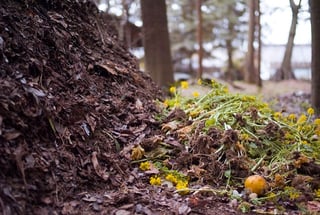When it comes to growing herbs, vegetables, and fruits one of the best things you can do for your plants is to use compost. Compost is broken down raw organic materials that feed your soil and plants with natural and vital nutrients. With these nutrients readily available your plants will thrive and be more productive. Compost is something that you can purchase from pretty much any lawn and garden store, but you can also make your own at home compost from things you already have. Check out this quick guide to composting if you are interested in starting to make your own!
With these nutrients readily available your plants will thrive and be more productive. Compost is something that you can purchase from pretty much any lawn and garden store, but you can also make your own at home compost from things you already have. Check out this quick guide to composting if you are interested in starting to make your own!
Composting is actually really simple. There are only a few concepts that you need to understand to be successful at making your own! All you are doing is putting organic materials into a pile with enough moisture and occasionally stirring it up or turning it to make sure that enough oxygen is getting into the pile. Outdoor piles are a great option if you intend to use leaves, grass clippings and other materials that will make a lot of compost.
Benefits of Organic-based Fertilizers
To start your pile, you will need to make a container. This can be done with wire fencing or wooden crates you put together to make walls that will hold up the compost. Leave one side open to allow for easy maintenance. You will want to place it in an area that gets a lot of sunlight as this helps heat up the pile and put your pile on the fast track to becoming finished compost.
Once you have your walls up in a sunny place, it is a good idea to start by putting your ingredients right on the ground. Start with large chunky items like woody stems and branches. This will help with the proper airflow that helps to break down the material. After that, you will alternate adding green and brown materials to keep the good bacteria happy and doing their jobs.
Green materials are things like grass clippings and kitchen food scraps like fruit peels. Make sure not to add scraps of meat, dairy, or fish because these attract critters and pests. Green materials are high in nitrogen while brown is high in carbon. Brown materials include things like sawdust, twigs, newspaper, or dry leaves.
As you add to your pile, make sure to turn the pile every week or two weeks to allow oxygen to get into the pile and to mix all the ingredients together. Make sure the pile feels damp as the appropriate amount of moisture speeds the process along. Too much will only leave you with a slimy, gross pile.
If you need help with your lawn give Greenfeet Lawncare a call or Click the link below for a Free Estimate.
Greenfeet Lawncare Provides Service to the Following Areas
770.619.2929
North Fulton, East Cobb, Cherokee, Forsyth Counties - including Alpharetta, Canton, Cobb, Cumming, Dunwoody, Gwinnett, Johns Creek, Marietta, Milton, Roswell, Sandy Springs